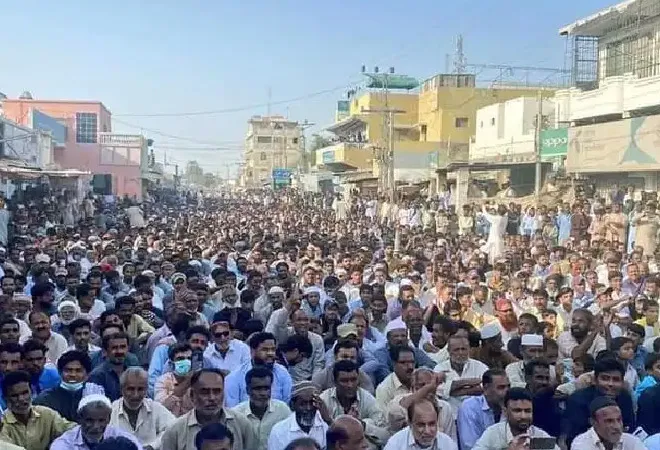
There are many groups in Pakistan, both ethnic and religious, that suffer from political neglect and government indifference. Particularly in the resistive province of Balochistan, the grievances of the local population against Islamabad and Rawalpindi are often not voiced, fearing to be on the receiving end of a brutal crackdown or media blackout. However, an exception seemed to be made in December 2021, when the government acknowledged and agreed to certain demands made by local population in Gwadar. This is not to be seen as a turning point in the government’s compassion for its citizens but rather a clear signal of the Pakistan’s government’s compassion for the Chinese and their deep pockets.
The Gwadar Ko Haq Do (or Give Gwadar its rights) movement saw tens of thousands of women, men, and young children marching on the main roads of the city, home to the ‘prized jewel’ of the China Pakistan Economic Corridor (CPEC)—the Gwadar port—chanting slogans against the provincial government.
In November 2021, protests began in Gwadar, Balochistan, with the local population demanding better rights and livelihood. The
Gwadar Ko Haq Do (or Give Gwadar its rights) movement saw tens of thousands of women, men, and young children marching on the main roads of the city, home to the ‘prized jewel’ of the China Pakistan Economic Corridor (CPEC)—the Gwadar port—chanting slogans against the provincial government. Protestors had a long list of
demands, including better access to electricity and education, the removal of unnecessary check posts, and action against the ‘trawler mafia’ which has ruined the livelihood of the local fishermen in the coastal city. Over a month after the protests began, the Balochistan government promised to implement the measures the protestors were demanding, leading the protestors’ leaders to end their sit in. While the state usually dismisses such civil society protests quickly, calling them anti-state, this particular movement in Gwadar did not suffer the same fate. The Prime Minister Imran Khan called their demands ‘
legitimate’ and gave in to their demands fairly quickly.
The unfolding of the events in Gwadar reflect two main things. The first being that these are the side-effects of ‘development with Chinese characteristics’. Pakistan believed that the construction of the CPEC and the use of a state-of-the-art port in Gwadar would mean economic resilience and the creation of jobs. It was sold the same lie that other nations such as Sri Lanka or Djibouti also bought; they all hoped that getting into bed with China would lead to economic prosperity and developmental growth.
The economic activity generated in Gwadar had continued to benefit Chinese firms and workers, leading to a deep sense of hostility amongst the locals towards Beijing.
Unfortunately, Chinese projects have not provided the local population employment opportunities as it had promised. While Chinese trawlers have depleted fish stocks and exploited natural resources, the project has also fueled high level of corruption with retired army officials being appointed in key positions overseeing CPEC and filling their pockets. The
economic activity generated in Gwadar had continued to benefit Chinese firms and workers, leading to a deep sense of hostility amongst the locals towards Beijing. While the Pakistani state maintains the fallacy that the Chinese-fueled ‘development’ in Balochistan will benefit the local population, the sad reality is that these protests saw locals demanding basic necessities, such as clean drinking water and basic health facilities. Instead of Gwadar making Balochistan an economic haven, integrating the province into the rest of Pakistan, the port project has had the opposite effect of alienating the local population as the Pakistan government continues to make empty promises and commitments to them.
The Gwadar protests also give a greater insight into how the Pakistani state chooses to deal with different civil society groups. Protests by citizens against the lack of rights granted to them by the state are commonplace in the country. A multi-party opposition alliance, Pakistan Democratic Movement (PDM), have repeatedly criticised the Pakistan Tehreek-e-Insaaf (PTI) government for their economic policies and the rising inflation. The Pashtuns have also held peaceful protests under the banner of the Pashtun Tahafuz movement against the state for their lack of rights in the tribal areas, Khyber Pakhtunkhwa and Balochistan. They have been the victims of state repression and persecution, with the government labelling the protests as anti-Pakistan. This is similar to how the state has dealt with certain Baloch groups, including the peaceful ones, labelling them as treasonous and repressing them further with military might. Other protests have, however, been successful, particularly those led by the religious right. Groups such as the Tehreek-e-Labaik Pakistan have been highly effective in extracting concessions from the state through their violent, extremist actions including killings, vandalising public property, and holding the government hostage until their radical demands are met. The Pakistan government remains consistent in its policy of appeasing groups—violent or peaceful—that they fear will either hurt their relationship with China (like the Gwadar protestors) or damage their association with the ultra-orthodox far-right groups (like the TLP).
The Pashtuns have also held peaceful protests under the banner of the Pashtun Tahafuz movement against the state for their lack of rights in the tribal areas, Khyber Pakhtunkhwa and Balochistan.
Even though the protests in Gwadar might be called off for the time being and the government may realise the importance of keeping the local population on their side, the protests have demonstrated that the local population not only in Gwadar, but all around the Makran coast has the potential to mobilise, remain peaceful, at least for the time being, and demand what is rightfully theirs. It is vital that the provincial government, the PTI government, and most importantly, the military realise that the local population, not the foreign government, must first and foremost reap the benefits of the development projects in the own backyard. If not, it will eventually bring about the long unravelling of the delusion that the Chinese can bring about transformational change in the country.
The views expressed above belong to the author(s). ORF research and analyses now available on Telegram! Click here to access our curated content — blogs, longforms and interviews.



 There are many groups in Pakistan, both ethnic and religious, that suffer from political neglect and government indifference. Particularly in the resistive province of Balochistan, the grievances of the local population against Islamabad and Rawalpindi are often not voiced, fearing to be on the receiving end of a brutal crackdown or media blackout. However, an exception seemed to be made in December 2021, when the government acknowledged and agreed to certain demands made by local population in Gwadar. This is not to be seen as a turning point in the government’s compassion for its citizens but rather a clear signal of the Pakistan’s government’s compassion for the Chinese and their deep pockets.
There are many groups in Pakistan, both ethnic and religious, that suffer from political neglect and government indifference. Particularly in the resistive province of Balochistan, the grievances of the local population against Islamabad and Rawalpindi are often not voiced, fearing to be on the receiving end of a brutal crackdown or media blackout. However, an exception seemed to be made in December 2021, when the government acknowledged and agreed to certain demands made by local population in Gwadar. This is not to be seen as a turning point in the government’s compassion for its citizens but rather a clear signal of the Pakistan’s government’s compassion for the Chinese and their deep pockets.
 PREV
PREV


